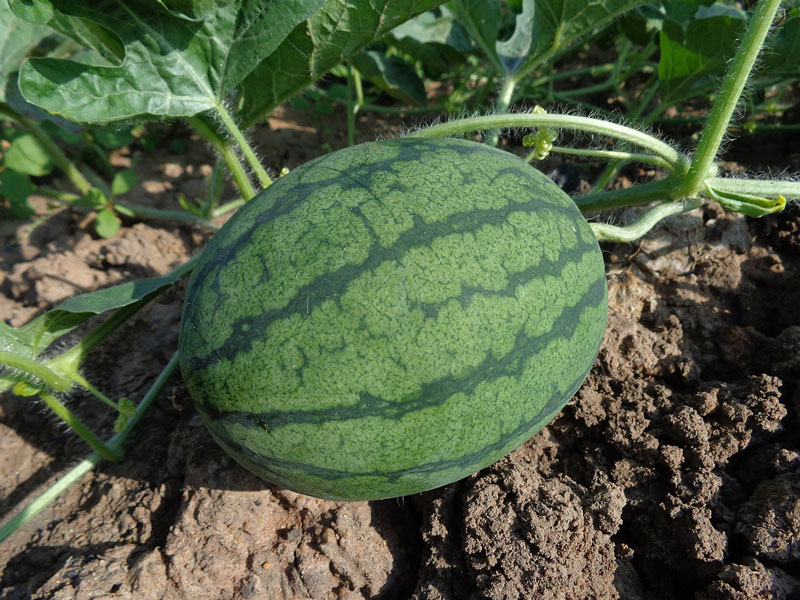
When watermelons are ripe, they’ll have a dull sound when thumped. Keep reading for other hot weather gardening tips and to-dos.
Summer weather has arrived. Here are some helpful hints for the hot and dry season.
• Is there a spot of land you need/want to clear for fall gardening? Solarize it. Lay down a piece of plastic and secure it with rocks. Then let the sun do the work. If it is a small spot, you can use a lawn/leaf trash bag. It will get hot underneath the plastic, like the inside of a dark-colored car in the sun.
• Prune herbs to encourage growth. For instance: Prune your basil before the flowers emerge. Pruning your mints makes for some wonderful sun tea. Isn’t it fun to cut sprigs, place them in water on the kitchen windowsill, and watch them grow? Sure makes the kitchen smell yummy, too.
• Water fruit and nut trees often and deeply to avoid fruit drop-off. Water in the early morning long and deep. Never water in the middle of the day. If you water in the middle of the day in Texas, the water will get hot and you might fry or steam your trees.
• Plant: corn, eggplant (transplants), greens (warm season), okra, Southern peas, pepper transplants in mid-July; sweet potato slips, and pumpkins through the first week of July to be ready for Halloween.
• When watering potted plants, make sure the water is getting to the roots. A good rule of thumb is 3 inches down. You can measure by sticking a wooden ruler, dowel, or popsicle stick into the soil. Water deeply and allow it to completely dry to avoid root rot, then repeat.
• While you have your ruler, double check the depths of your mulch. Is your mulch 3-4 inches deep? If not, time to add some on top.
• Have you started composting? In the heat, compost materials break down to a wonderful fertilizer. You can use kitchen scraps such as coffee grounds and filters, celery tops, apple cores, orange peels, and crushed eggshells for starters. Crushed eggshells also will cut up grub worms. Don’t use animal products such as grease or trimmings. Animal products break down SLOWLY and attract all kinds of unwanted varmints. You can also add dry leaves, grass clippings, manure (not dog or cat), sawdust, hay, and hedge clippings. If you are making a compost pile, turn it at least once a week. If you are using a tub, rotate often.
• In our gardens, we might have two types of insect pests: the ones that chomp away at plants and the ones that suck juices from them. To deter these pests, mow around your garden. Keep your plants healthy with fertilizer and watering. After you have harvested all the fruit and vegetables, remove the expired plant, throw it in your compost, or till it into the soil. Leaving the old plant out and exposed continues to attract the chompers and suckers.
• When should you harvest your melons? Watermelons ready to be picked will have a dull sound when thumped. They also lose their glossy color when ripe. When honeydew and cantaloupe are ripe, the end of the fruit not connected to the vine softens. Use your thumbs to push down on that end; it should give a little when the fruit is ripe. One reason you don’t want to harvest melons too early is because they won't continue to sweeten after being picked from the vine like other fruits. Melons are delicious in salsas, sorbets, and margaritas.
• Yellow cucumbers will have an intense flavor, so harvest them when they are green and just the right size. Add dill and vinegar for pickles. Or, slice and freeze them for your water bottle.
Till next time. Keep your souls and soles in your garden!
Remember the True Master Gardener: Jesus said, “I am the vine; my Father is the Gardener.” John 15:1
Contact Bill Luedecke at The Luedecke Group Realtors at 512-577-1463 or email him at bill@texasland.net. Contact Martelle Luedecke at Luedecke Photography at 512-769-3179 or luedeckephotography@gmail.com.










